Table of Contents
- Script Reader Jobs: Where Do I Start?
- Types & Tiers of Script Reader Jobs:
- Resume And Interviews:
- What Makes A Good Script Reader?
- Who Might Hire a Script Reader?
- Getting Jobs As A Script Reader:
- 10 Ways Script Readers Find Work…
- To Enhance Your Industry Intel And Increase Your Chances Of Hearing About Opportunities, You Can Take The Following Steps:
- How Much Do Script Reader Jobs Pay?
- Should I launch my own Public Script Reading Service?
- How To Become A Script Reader:
- Script Reading Jobs: Round Up
Like it or lump it, the role of the industry script reader is becoming increasingly important in film and TV.
With the volume of scripts increasing year-on-year, the challenge for those in power becomes one of filtration – everybody wants great writers and everyone wants hits, right?
But hardly anyone has the resources or manpower to fully “cover” (script coverage = read and get a report written) the amount of material they’d like to.
Enter, stage right, the pro script reader.
A usually sophisticated and hardy soul, the truly outstanding script reader is so few and far between that the great ones barely have time to congratulate themselves on getting that first reading gig for Warner Bros. before they’re buried in a giant tidal wave of PDFs.
It’s rare, however, for readers to move on that quickly.
- So how does a script reading career progress?
- The different types of script reader jobs are out and what there is to choose from?
- What is the pay like?
Script Reader Jobs: Where Do I Start?
Starting a career as a script reader may seem daunting. You may be asking yourself:
- Where do I begin?
- I don’t know anyone in the industry who can help me?
- What do I do?
There is no clear-cut answer. However, there are a couple of things you can do to kickstart this process which we have gone into detail below.
Types & Tiers of Script Reader Jobs:
As we explain in our “Effective Script Reading” course, there are essentially 3 tiers of job in this sector, and although the hierarchy isn’t absolutely set-in-stone, it’s tough to bounce straight from Stage 1 or even Stage Zero, to Stage 3. These tiers are:
- Script reading for FREE for reputable, but very small companies, on the rise.
- Paid pro script reading for SIGNIFICANT, established production companies, lit agents and funds.
- Paid pro script reading for MAJOR, A-LIST, ultra-prestigious companies and even the Hollywood studios.
In real (theoretical) terms, these 3 stages might translate as:
- Get a job as a script reader for a respected but small production company.
- You advance and get script reading jobs for the likes of the mini-majors.
- Eventually, you advance and get script reading jobs for Warner Bros., Paramount, Scott Free or the streamers.
Resume And Interviews:
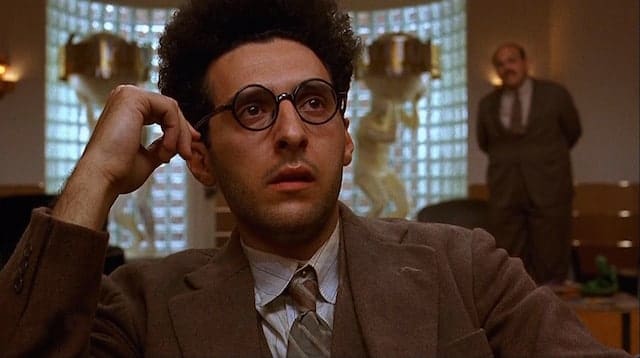
When you are starting out as a script reader, your goal is to arm yourself with collateral, so that when companies ask you “who do you read for?”, you have concrete, credible answers for them.
This does not mean: “I read for Naughty Badger Films” or “I read for Low-Rent-Gangster-Flics-R-Us”.
You do this by reading for free for respected companies and individuals, who in turn connect you to the bigger players, or help you enhance your resume.
Look carefully at the company you’re approaching, and try and gauge their level of their relationships –
- Who do they obviously deal with?
- Do they know anyone who might be able to pay you if you impress their friend/colleague?
- Has their company been mentioned in positive dispatches in Variety or The Hollywood Reporter?
Only read scripts for reputable companies – there are a great many companies looking to exploit new readers, and although you might gain some experience working and providing script coverage for a low-profile company, it won’t help you answer that crucial question:
“who else (of note) do you read for?”
Then when you are reading for free, you need to ensure that your script coverage is as good as humanly possible. Some fortunate souls manage to by‐pass reading for free completely through the quality of their connections.
However, if you don’t know anyone, then it’s a necessary evil if you want to progress in your career as a script reader.
What Makes A Good Script Reader?
Something you should consider before applying for script reader roles, is the job itself. It may sound like an obvious point to make, but it is essential.
A Script Reader Should Ideally…
- Be obsessed with reading (both reading scripts and reading in general). This is your passion; you need to live and breathe it. You are looking to go into a job which is centred around reading. It may seem obvious, but it is important to remember what you are letting yourself in for.
- Thrive off developing and reading stories and should be constantly watching and keeping up to date with current television shows, films and documentaries. You should be watching anything and everything.
- Have a passion for drama and narrative techniques
- You need to know how storytelling functions and spot a good one from a bad one
Who Might Hire a Script Reader?
There are various different companies, individuals and organisations who need script readers. They include:
- film production companies
- independent film producers
- Hollywood studios
- film distributers
- film sales agents
- film financiers and funds
- Training organisations and funding bodies
- Funding schemes that appear from time to time
- Screenwriting competitions
- Theatres
- “marquee” name directors
- literary agents
- talent agents
- actors themselves
- TV production companies
- Broadcasters
- Regional funding agencies
- Film festivals (occasionally)
Getting Jobs As A Script Reader:
Script development is one of the most information-driven areas of the film and television industry. One of the ways you prove yourself as a script consultant is by getting to that promising new writer or OSCAR-winning script before anyone else.
In this frenzied race where everyone tries to out-read and out-network one another, you can never read scripts too much, make enough phonecalls, or network enough. A very senior development person once said that being “on it” in this way is what impresses the executives and producers most, more even than good taste and script judgement.
And in the world of script coverage being “on it” is equally important, and developing an “eye for a gap” is vital, too.
There are some “guerrilla tactics” that you can use to help seize every opportunity or create one for yourself.
10 Ways Script Readers Find Work…

- First in line... – have your finger on the pulse of the industry so you will be the first to know about any opportunities.
- The Skilled Coldcall – this is tough for most people, but easier with repetition. Research who you want to ask for, be pleasant, find a connection to them, keep them talking, and ask for less than you want (ie. advice or coffee).
- The Eye for a Gap – spot an opportunity and be proactive.
- …and Creating or Manufacturing Your Own Gap! – be creative and find a way to create the opportunity you seek.
- In by the back door… – a camera DP worked at a cafe at Pinewood and met the people he needed to meet in the company and eventually became part of the SKYFALL camera department.
- Information Overload – browse IMDB, follow important people on Twitter, read trade publications such as Variety, Screen Daily etc.
- Rounds of Coffees – find names, get in touch to ask for advice, meet people, ask them if they’d connect you to a couple of other contacts. Repeat. There’s a skill to it, you mustn’t push your luck too much with the favours, but it’s not rocket science.
- The Road less travelled… – use your connections to theatre, actors, or directors, as well as any foreign language skills you may have. If you can read scripts and provide script coverage in a foreign language, arrow in on companies with an international presence.
- Face Time – talk and meet with people face to face. It can be helpful to know what someone looks like, so when you see them at events you can approach them.
- Persistance – Extremely important. You will be rejected, but keep going.
To Enhance Your Industry Intel And Increase Your Chances Of Hearing About Opportunities, You Can Take The Following Steps:
- Think about joining IMDbpro.com – an invaluable contacts and information tool for $20 or per month.
- Create a Companies House subscription – this is great source of information on TV and film companies.
- Know what people look like so if you come into contact with you’ll recognize them.
- Sign up to as many film mailing lists as possible (it can be tedious weeding through these lists as they arrive in your inbox daily, but just one of these snippets of information could lead to a job).
- Try and identify areas that other script readers aren’t capitalizing on (looking for “under the radar” indie producers is a good idea).
- Read the trade papers and magazines – particularly Screen, Variety, Deadline and The Hollywood Reporter, religiously.
- Make sure to keep in touch with key contacts. Set alarms in your calendar to reconnect with people of influence every 8-12 weeks.
- Attend every networking event, however small, and definitely attend the big ones. Going to Cannes is expensive, but you’ll invariably have a great time, and meet lots of people who will be helpful to you in the future.
- Form lists in Excel of producers and companies you’d like to work for.
How Much Do Script Reader Jobs Pay?

Like in any highly competitive, creative job, script readers typically have to pay their dues. This is why it is often necessary to work for free. Unpaid script reading jobs may not pay in cash, but they do provide opportunities to get experience and make connections with the right people.
An important part of script reading is building your resume and skill set. Because it can take years to progress from one tier to the next, script readers need to be patient and passionate about the work they are doing. In the US, script readers earn about $40-60 per piece of script coverage.
However, if they join the script readers union in the US, they will be paid more.
Should I launch my own Public Script Reading Service?
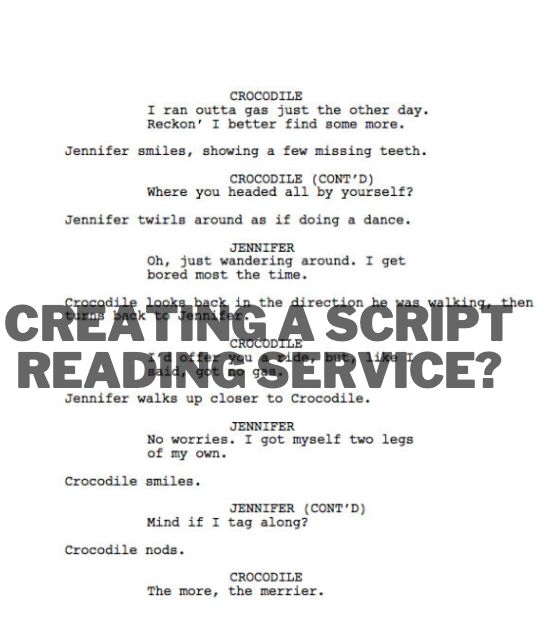
This is widely frowned-upon in the corridors of power for the simple reason that unless you’ve “made your bones” and got hired by major companies, and ploughed through those 2,000 industry-level script reports, what are you selling?
A screenwriting degree?
The fact that you “get” story better than the milkman?
So, all those English lit essays you wrote means you’ve got some textual style?
You read scripts a number of times and wrote a few reports on a peer-to-peer site?
Until you’ve been there, done it, and got the industry T-shirt you just don’t have anything credible to sell, in the eyes of the executives, managers, producers and agents.
Unless you’ve…
- a) read for major, major companies over a prolonged period of time (say, 5 years) OR
- b) held a major script development job of significance for a company everyone knows and rates…
…you’re going to be harming your career before its even got started.
Throw in the low pay, the fact that writers aren’t stupid and will only hire bona fide consultants with demonstrable industry experience and, well, most execs and industry pros are foxed why people keep having a go at launching their own script reading services.
Bide your time.
Wait.
“Make your bones” in development, and then if you want to run your own outfit years later you’ll both fully equipped to do so, and respected.
You can check out how a typical, successful career in script development pans out via the chart below:
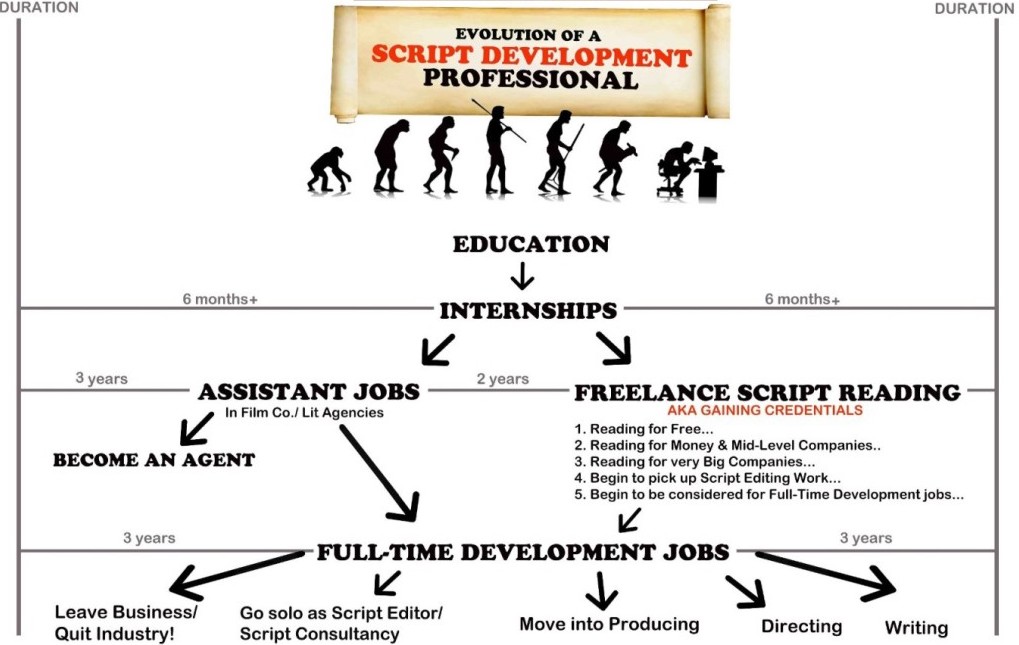
How To Become A Script Reader:
Our 1-day “Effective Script Reading for Film & TV Course” has been running for many years, and has rapidly accelerated the progress of many readers.
The course is the first to focus heavily on the skills required to locate and gain script reading jobs – jobs which are never publicly advertised and require a specific range of skills and a certain well of resourcefulness to acquire.
Containing both a pre and post course homework assignment (practicing script coverage), our course can’t turn you into a great script reader overnight, but it can save you a lot of time, wasted man-hours and mistakenly blown opportunities in the process.
Just click here to read further information about the course, or to book your place.
Enjoyed this article?
Read our pieces on “11 Reasons for the High Turnover of Script Consultants” and “Evolution of a Script Development Professional”.
Script Reading Jobs: Round Up
A script reader exists primarily to act as a filter. He or she is there to ensure that only strong scripts get through to extremely busy tastemakers. The script reader can also act as both a quality-control mechanism for screenwriters, and offer a route to improve the quality of the screenplay itself, via constructive script notes (known as script coverage).
Script reader jobs are rarely lucrative, and are paid on a per-script basis. As a pro script reader you’ll typically be self-employed, and work from home. There are multiple reasons why script reading jobs are rarely lucrative: the work is, obviously, hardly laying tarmac (it’s reading stories from bed and giving your opinion on them!); competition is accordingly fierce for the work; film and TV companies rarely have huge amounts of development money to spend on readers; and finally the barrier to entry for said competition is low (everyone has an opinion). Most TV and film companies pay between $40-$60 or so for script coverage, therefore.
A Hollywood script reader is one who works exclusively for US companies: Hollywood studios, mini-majors (like Lionsgate) and the streamers including Netflix, Amazon, HBO and others.
The key to becoming a pro script reader is to start reading for free for smaller, reputable producers. These producers will then hopefully refer you to bigger ones, and then your resume will begin to grow and you’ll move up to reading for the studios or the streamers. Alternatively, you could also take a script reading course, where you’ll be able to write test script coverage, perform exercises to improve your script analysis skills, and generally upskill.
- What did you think of this article? Share it, Like it, give it a rating, and let us know you though in the comments box further down…
- Struggling with a script or book? Story analysis is what we do, all day, every day… Check out our range of script coverage services for writers & filmmakers.
Get *ALL* our FREE Resources
Tackle the trickiest areas of screenwriting with our exclusive eBooks. Get all our FREE resources when you join 60,000 filmmakers on our mailing list!

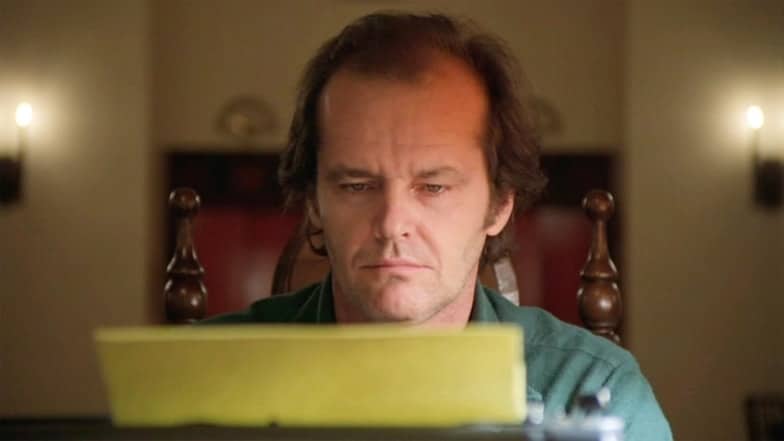
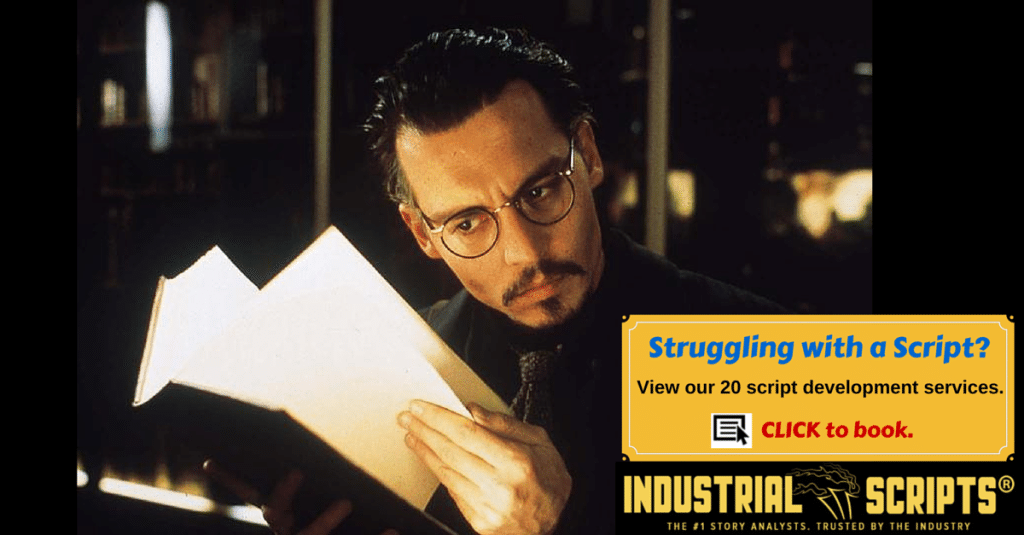

thanks alot amazing
Interested in reading film scripts
Yes very much so
Am interested in reading scripts.
I m interested in writing and reading paid professional scripts….
I am interested in film scripts .
Interesting subject about the Film and Television Industry that not many outsiders know about. Would like TO know more how scripts are developed.
I think this might be little bit good
I’m a Content Writer and Master in Journalism and mass communication. Currently working with an Astrology Institute and want to enhance my career and knowledge in the field of writing and reading. I’m interested to know more details regarding script reading jobs.